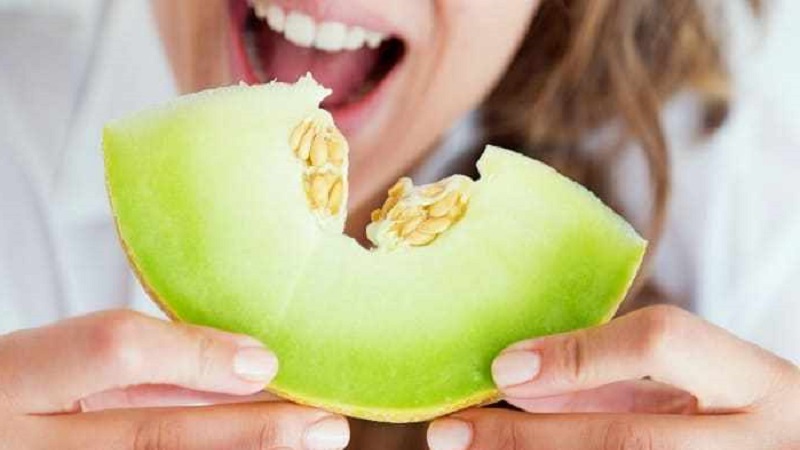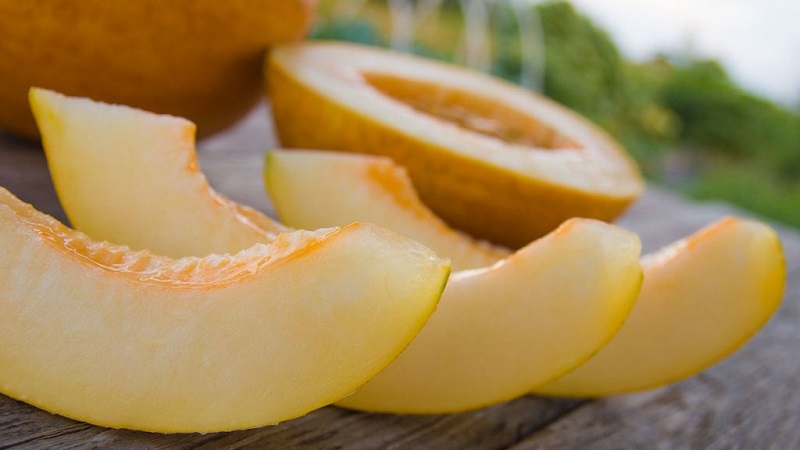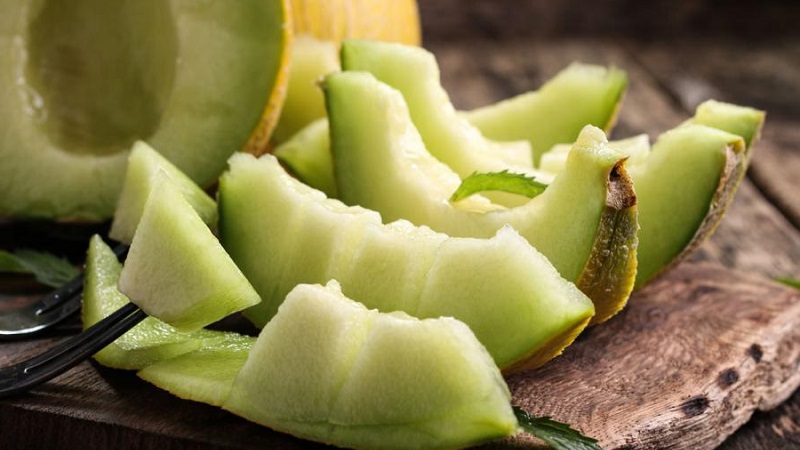How much melon can you eat per day: consumption rates, beneficial properties and calorie content
Man began to grow melon long before our era, and now there are more than three hundred different varieties of it for every taste. Among them there are crumbs weighing no more than 250 g, elongated and indistinguishable in shape from cucumbers, and even fruits covered with thorns.
Melon is extremely beneficial for the body. But at the same time, it is not at all as harmless as it is commonly believed. For some people, it is categorically contraindicated. So that the use of melon brings only pleasure and benefit and does not turn into trouble, we advise you to familiarize yourself with its features.
The content of the article
Composition and nutritional value
There is a myth that melon contains only water and sugar and is completely useless. A detailed study of its pulp, rind and seeds proved the opposite. Fruits are a storehouse of a variety of useful vitamins and minerals.

100 g of melon contains:
- calories - 34 g;
- fats - 0.2 g;
- saturated fat - 0.1 g;
- polyunsaturated fatty acids - 0.1 g;
- monounsaturated fatty acids - 0 g;
- cholesterol - 0 mg;
- sodium - 16 mg;
- potassium - 267 mg;
- carbohydrates - 8 g;
- fiber - 0.9 g;
- sugar - 8 g;
- proteins - 0.8 g;
- vitamin A - 3% of the acceptable daily intake (ADI);
- vitamin C - 30% of ADI;
- vitamin B6 - 4.5% of ADI;
- folic acid - 4.5% of ADI;
- vitamin K - 3% of ADI;
- potassium - 7% of ADI;
- magnesium - 2% of ADI.

It is interesting! The calorie content of a melon largely depends on the variety. Some varieties (for example, Kolkhoznitsa) have an energy value of only 30 kcal, while for others this figure exceeds 40 kcal.
Melon pulp and seeds contain compounds with a high antioxidant capacity, including beta-carotene, starch, proteins, carbohydrates, dietary fiber, free organic acids, potassium, iron, vitamins C, PP, B1, B2, carotene, folic acid, magnesium, phosphorus, calcium, inositol, silicon.
All these substances benefit the body, and without some, its functions are completely impossible. Let's consider the useful properties of the main ones:
- Silicon improves skin and hair condition.
- Iron is essential for the normal functioning of the circulatory system. Melon contains 17 times more iron than milk and 3 times more iron than fish.
- Vitamin C restores and strengthens the immune system. 100 g of cantaloupe contains almost a third of the daily value of this vitamin, making it an excellent alternative to citrus fruits, especially for those who are allergic to them.
- Beta-carotene makes the skin soft and smooth and improves its color. Here, the melon is considered one of the record holders for the content of this substance, even beating carrots.
- Folic acid is essential for the normal functioning of the nervous system. It promotes the production of serotonin (the hormone of joy), and it is known to give a person peace of mind and improve mood. Also, this acid is involved in the process of hematopoiesis.
- Magnesium is beneficial for the normal functioning of the heart muscle.
First of all, people should pay attention to melonwho suffer from atherosclerosis, anemia, cardiovascular and kidney and liver diseases, disorders of the nervous system. It strengthens the immune system, increases hemoglobin levels, helps with insomnia and normalizes stool for constipation.
It is interesting:
Usage rates
Sometimes it's difficult to resist the temptation to eat an extra piece of sweet and juicy pulp, especially on a hot day. However nutritionists and gastroenterologists do not recommend exceeding the permissible norms for the consumption of melon... There are several reasons for this:
- Melon contains a lot of coarse fruit fiber. On the one hand, it helps cleanse the intestines and helps with constipation, but on the other hand, it can itself be the cause of eating disorders. Digesting fiber takes a lot of resources in the digestive system. Therefore, the additional load on the gastrointestinal tract in the form of related products can lead to unpleasant consequences.
- Eating unrestricted cantaloupe can lead to the body becoming overloaded with healthy fats and proteins, and imbalances occur. For the health and normal functioning of the body, it is important to observe the daily intake of certain elements.
- The fruits are high in sorbitol. In moderation, it has a beneficial effect on the body. But consuming too much of this substance can lead to diarrhea and flatulence.
- If consumed in large quantities, melon can burn the lining of the intestines and stomach. To avoid this, it is necessary to dose portions.

As you understood melon abuse can lead to very unpleasant consequences... In order not to harm yourself, nutritionists recommend exercising restraint in the use of this product.
How many melons can you eat per day? Adults can consume no more than 300-500 g for 3-4 doses... In this case, it is worth maintaining an interval of 1 hour before a meal and 2 hours after it.
For the coming sleep
Nutritionists have concluded that eating melon before bed is undesirable... Digestion is slower at night than during the day. Due to the large amount of fiber in the melon, the load on the gastrointestinal tract, especially on the pancreas, increases.
 This can lead to bloating and discomfort.which do not contribute to sound sleep at all. In addition, eating sweet or sour foods late at night can impair sleep quality.
This can lead to bloating and discomfort.which do not contribute to sound sleep at all. In addition, eating sweet or sour foods late at night can impair sleep quality.
The approximate digestion time of the melon is 30-40 minutes... This is more than the absorption of most fruits and vegetables. Also, a number of minerals contained in a melon accumulate in the intestines and are excreted for a long time.
To avoid discomfort at night it is recommended to consume the melon 3 hours before bedtime... During this time, the body will have time to fully digest and assimilate all the substances.
For expectant mothers
The most acute issue of proper nutrition is among pregnant women, young mothers and young children. The doctors concluded that eating melon has a positive effect on the health of pregnant women.
This is primarily due to the abundance of folic acid in fruits.... It improves the digestion of the mother and stimulates the development of the baby's circulatory system. The peculiarity of this substance is that it is destroyed during heat treatment, therefore the range of products from which it can be obtained is limited.
Do not forget that melon effectively and gently removes water from the body... This helps to avoid the occurrence of edema, which often cause a lot of inconvenience to pregnant women. The recommended daily allowance for pregnant women by nutritionists is no more than 200 g, that is, approximately 2 slices.

For children
Melon is also recommended to be included in the diet for small children aged 1.5-2 years.... Its use has a beneficial effect on the functions of the gastrointestinal tract and prevents intestinal obstruction. But you also must not forget about the risk of allergies. Feeding should start with small portions and at first carefully monitor the baby's condition.
Note! A number of allergens tend to accumulate in the body. This can lead to the fact that, already as an adult, the child begins to dislike the melon.
Eating during a diet
Contrary to many beliefs, melon is great as a dietary food... With its help, the destruction of fat cells and nutrition of body tissues occurs. The pulp not only gives a feeling of fullness for a long time, but also makes up for the lack of water.
Due to a number of substances, the body is cleansed of heavy animal fats, toxins and cholesterol. It also has diuretic properties, which is important for those who want to lose weight. With such a diet, you need to consume 1-1.5 kg of melon per day in 4-5 doses.
Important! The melon diet has a number of limitations. Gastroenterologists do not recommend using melon pulp as a main ingredient for more than three days.
The variety, consistency and sweetness of the melon are important for the effectiveness of the diet.... Best of all, extra pounds go away thanks to fruits with fibrous or dense pulp. The mealy structure indicates a lower amount of mineral salts and sucrose. The value of such fruits is not so high.

Generally to cleanse the body, it is best to choose round and sweet melons, for example, varieties Medovaya and Kolkhoznitsa. In addition, they are the least nutritious.
There is a myth that unripe fruits must be chosen for the diet.... This is not true. Unripe melons do not contain many beneficial substances for the body. Also, like all green vegetables, they can cause stomach upset.
Fasting days
Melon is quite suitable for food on fasting days.... Thanks to it, the body receives a sufficient amount of vitamins and fluids, without needing water and additional nutrition.
Unlike watermelon, melon has a softer effect on the kidneys. and swelling does not occur from it. In a few days, from a mass of 70 kg, water can leave for a weight of up to 2–3 kg. Further, weight loss will occur less due to the effect on fats and subcutaneous components.
Read also:
Combining melon with other foods
A distinctive feature of melon is that it does not combine at all with other products., especially dairy. Eating it with fruits, yogurt, sour cream, milk or cream can lead to colic, indigestion and bloating. Do not use it as an appetizer for main courses or as a dessert after a hearty meal.
Melon can not be combined with drinks... Drinking it with kefir, milk, alcohol, lemonade and even plain water can also result in intestinal colic and bloating. Also, due to the abundance of fluid in the fetus itself, a strong load on the kidneys occurs.

Contraindications
Unfortunately, not all people have access to this delicacy. Even with healthy digestion, too much cantaloupe can cause indigestion.... Who shouldn't eat melon? First of all, it is contraindicated for people with diseases of the gastrointestinal tract. Those who suffer from gastric ulcer and duodenal ulcer, as well as other intestinal diseases, it is better to give up melon. It is strongly not recommended to use it during the period of exacerbation of the disease.
 The controversial issue of melon consumption by diabetics... Nutritionists agree that excessive consumption of melon is dangerous for such patients. Her glycemic index is 72. This is high, so blood sugar levels can rise. Therefore, it is better for people with diabetes to consult a doctor.
The controversial issue of melon consumption by diabetics... Nutritionists agree that excessive consumption of melon is dangerous for such patients. Her glycemic index is 72. This is high, so blood sugar levels can rise. Therefore, it is better for people with diabetes to consult a doctor.
Breastfeeding mothers should refrain from eating melon... Some substances through milk enter the baby's body and can provoke indigestion. This is due to the fact that the baby's body is not yet able to process them.
Do not forget that melon is a heavy food even for an adult body.... It is not recommended to feed it to a child under the age of one and a half years. This can cause diarrhea and colic. In order to avoid unpleasant consequences at first, you should limit yourself to apples, pears, bananas and peaches.
Conclusion
Melon is a healthy and delicious product that is loved by everyone, young and old. Its value is undeniable, but you shouldn't forget about the possible side effects.
The most important thing in eating melon is moderation and separate from other foods. If you follow the simple rules of nutrition, it gives pleasure and benefits the body.